Leadership Portfolio: Health Services Management, University Name
VerifiedAdded on 2022/11/17
|18
|4104
|343
Report
AI Summary
This leadership portfolio explores the multifaceted aspects of leadership within the health services sector. It begins with an introduction defining leadership and its importance, especially in healthcare, setting the stage for the author's personal aspirations to become a medical and health services manager. The portfolio delves into the author's leadership philosophy, shaped by both strong and weak leaders, and supported by examples like Mae Jemison and Eric Goosby. It outlines core beliefs emphasizing urgency, purpose, integrity, and the significance of trust, communication, and respect. The report then analyzes various leadership styles prevalent in healthcare, including democratic, transformational, authoritarian, transactional, and situational styles, with a preference for the latter. The author details their leadership strategies, which include employee training, implementing new performance goals, and ensuring employee engagement. It also highlights key leadership competencies such as social intelligence, communication, and ethical conduct. This portfolio offers a comprehensive view of the author's leadership journey and development plans, aiming to provide practical insights into effective leadership in healthcare.
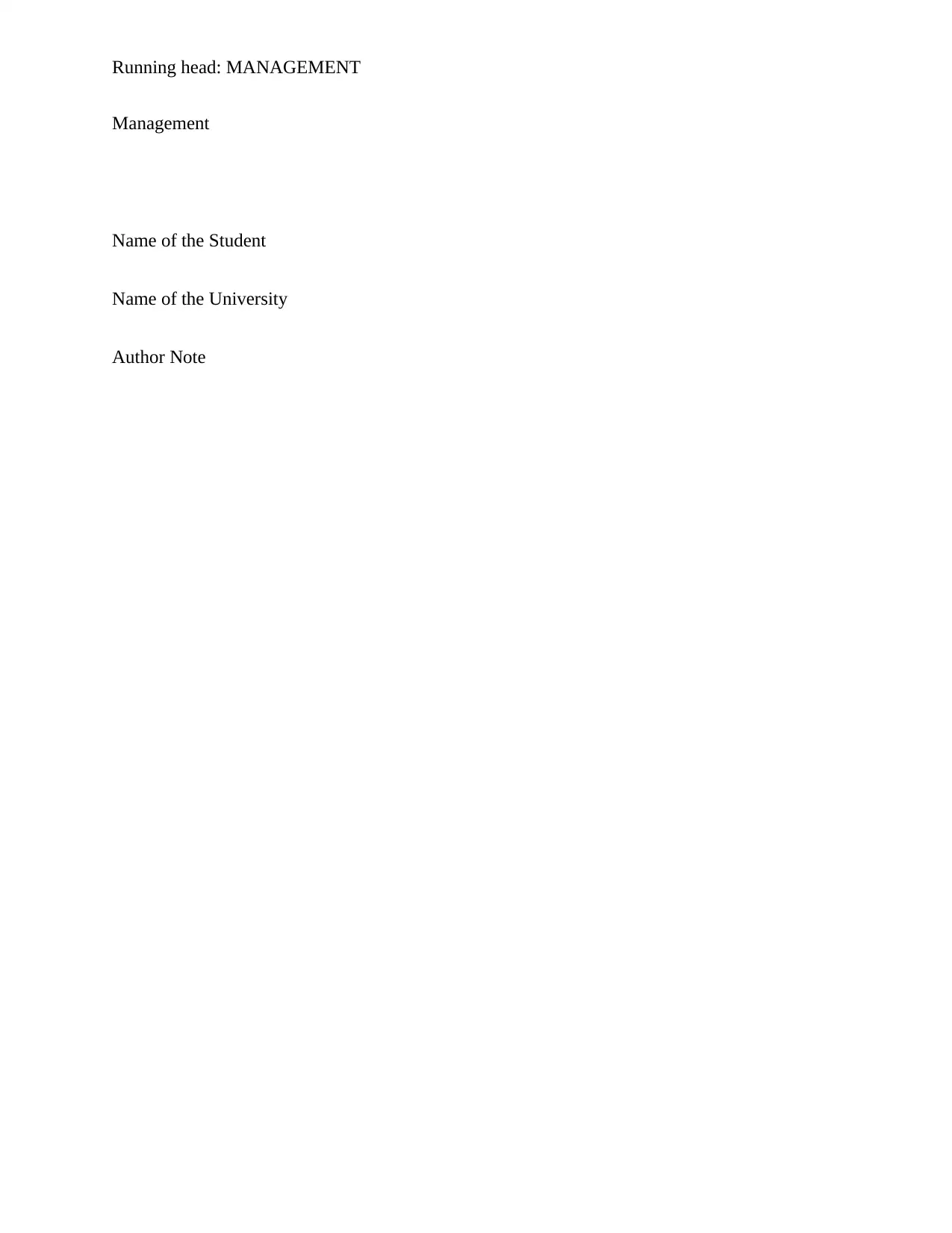
Running head: MANAGEMENT
Management
Name of the Student
Name of the University
Author Note
Management
Name of the Student
Name of the University
Author Note
Paraphrase This Document
Need a fresh take? Get an instant paraphrase of this document with our AI Paraphraser
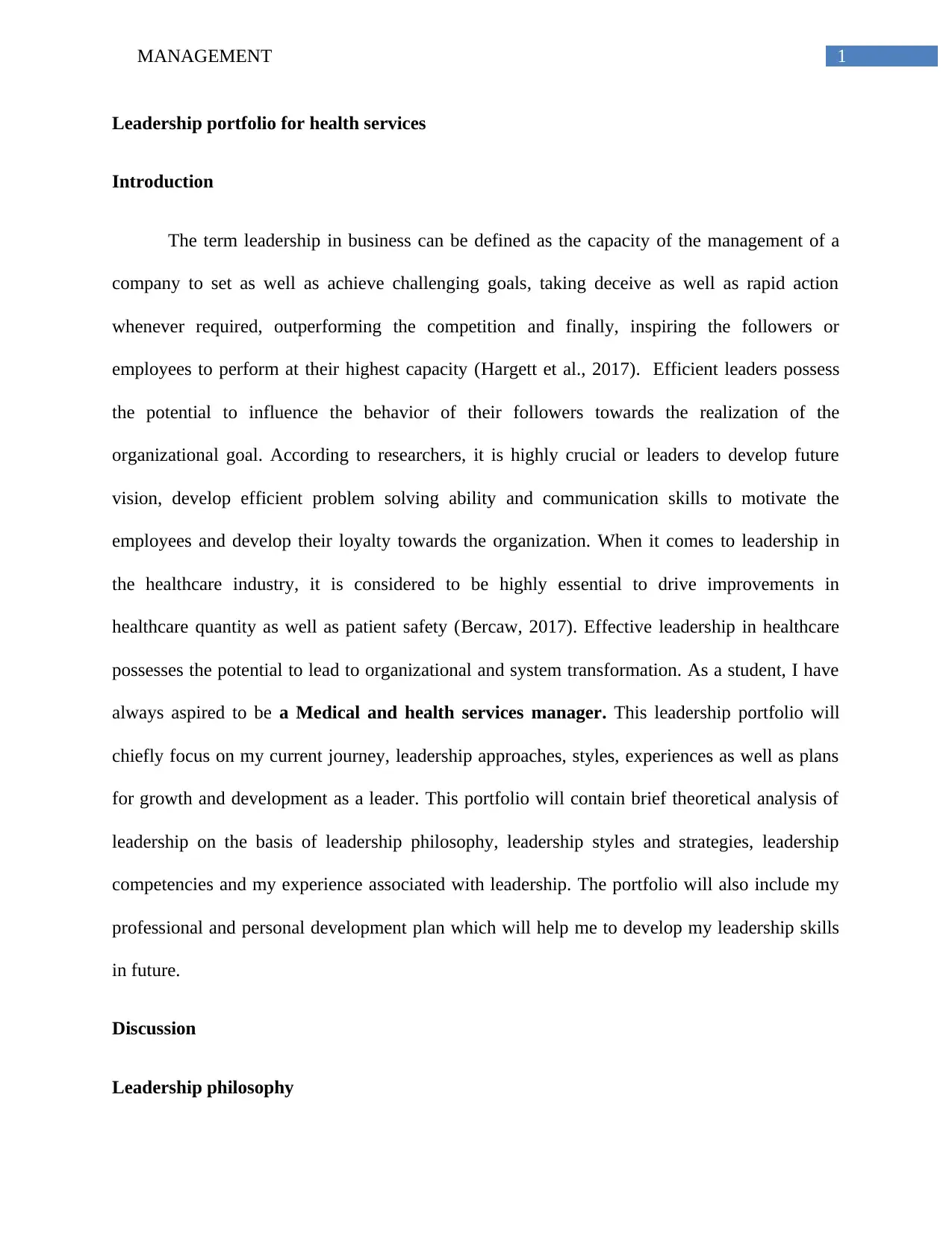
1MANAGEMENT
Leadership portfolio for health services
Introduction
The term leadership in business can be defined as the capacity of the management of a
company to set as well as achieve challenging goals, taking deceive as well as rapid action
whenever required, outperforming the competition and finally, inspiring the followers or
employees to perform at their highest capacity (Hargett et al., 2017). Efficient leaders possess
the potential to influence the behavior of their followers towards the realization of the
organizational goal. According to researchers, it is highly crucial or leaders to develop future
vision, develop efficient problem solving ability and communication skills to motivate the
employees and develop their loyalty towards the organization. When it comes to leadership in
the healthcare industry, it is considered to be highly essential to drive improvements in
healthcare quantity as well as patient safety (Bercaw, 2017). Effective leadership in healthcare
possesses the potential to lead to organizational and system transformation. As a student, I have
always aspired to be a Medical and health services manager. This leadership portfolio will
chiefly focus on my current journey, leadership approaches, styles, experiences as well as plans
for growth and development as a leader. This portfolio will contain brief theoretical analysis of
leadership on the basis of leadership philosophy, leadership styles and strategies, leadership
competencies and my experience associated with leadership. The portfolio will also include my
professional and personal development plan which will help me to develop my leadership skills
in future.
Discussion
Leadership philosophy
Leadership portfolio for health services
Introduction
The term leadership in business can be defined as the capacity of the management of a
company to set as well as achieve challenging goals, taking deceive as well as rapid action
whenever required, outperforming the competition and finally, inspiring the followers or
employees to perform at their highest capacity (Hargett et al., 2017). Efficient leaders possess
the potential to influence the behavior of their followers towards the realization of the
organizational goal. According to researchers, it is highly crucial or leaders to develop future
vision, develop efficient problem solving ability and communication skills to motivate the
employees and develop their loyalty towards the organization. When it comes to leadership in
the healthcare industry, it is considered to be highly essential to drive improvements in
healthcare quantity as well as patient safety (Bercaw, 2017). Effective leadership in healthcare
possesses the potential to lead to organizational and system transformation. As a student, I have
always aspired to be a Medical and health services manager. This leadership portfolio will
chiefly focus on my current journey, leadership approaches, styles, experiences as well as plans
for growth and development as a leader. This portfolio will contain brief theoretical analysis of
leadership on the basis of leadership philosophy, leadership styles and strategies, leadership
competencies and my experience associated with leadership. The portfolio will also include my
professional and personal development plan which will help me to develop my leadership skills
in future.
Discussion
Leadership philosophy
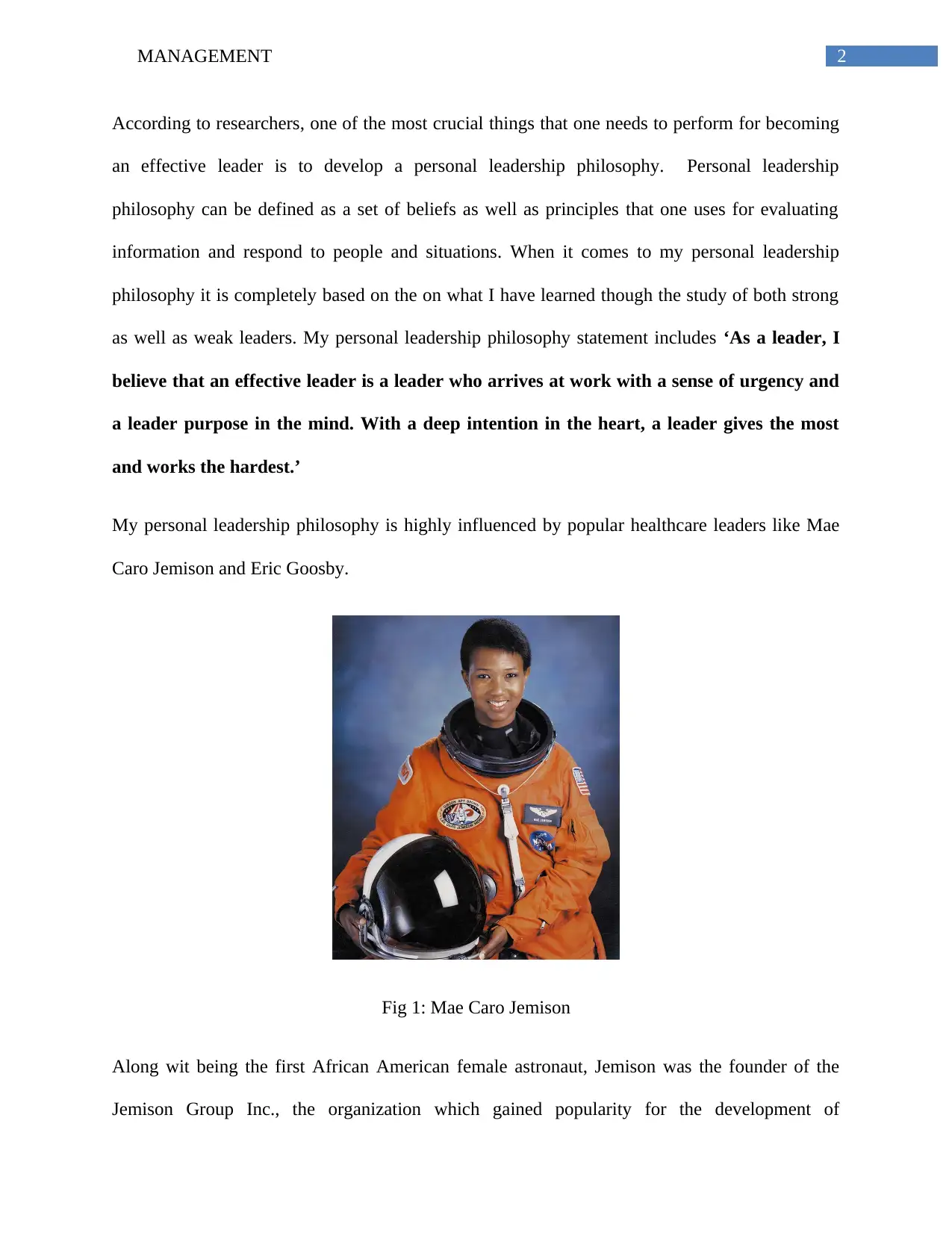
2MANAGEMENT
According to researchers, one of the most crucial things that one needs to perform for becoming
an effective leader is to develop a personal leadership philosophy. Personal leadership
philosophy can be defined as a set of beliefs as well as principles that one uses for evaluating
information and respond to people and situations. When it comes to my personal leadership
philosophy it is completely based on the on what I have learned though the study of both strong
as well as weak leaders. My personal leadership philosophy statement includes ‘As a leader, I
believe that an effective leader is a leader who arrives at work with a sense of urgency and
a leader purpose in the mind. With a deep intention in the heart, a leader gives the most
and works the hardest.’
My personal leadership philosophy is highly influenced by popular healthcare leaders like Mae
Caro Jemison and Eric Goosby.
Fig 1: Mae Caro Jemison
Along wit being the first African American female astronaut, Jemison was the founder of the
Jemison Group Inc., the organization which gained popularity for the development of
According to researchers, one of the most crucial things that one needs to perform for becoming
an effective leader is to develop a personal leadership philosophy. Personal leadership
philosophy can be defined as a set of beliefs as well as principles that one uses for evaluating
information and respond to people and situations. When it comes to my personal leadership
philosophy it is completely based on the on what I have learned though the study of both strong
as well as weak leaders. My personal leadership philosophy statement includes ‘As a leader, I
believe that an effective leader is a leader who arrives at work with a sense of urgency and
a leader purpose in the mind. With a deep intention in the heart, a leader gives the most
and works the hardest.’
My personal leadership philosophy is highly influenced by popular healthcare leaders like Mae
Caro Jemison and Eric Goosby.
Fig 1: Mae Caro Jemison
Along wit being the first African American female astronaut, Jemison was the founder of the
Jemison Group Inc., the organization which gained popularity for the development of
⊘ This is a preview!⊘
Do you want full access?
Subscribe today to unlock all pages.

Trusted by 1+ million students worldwide
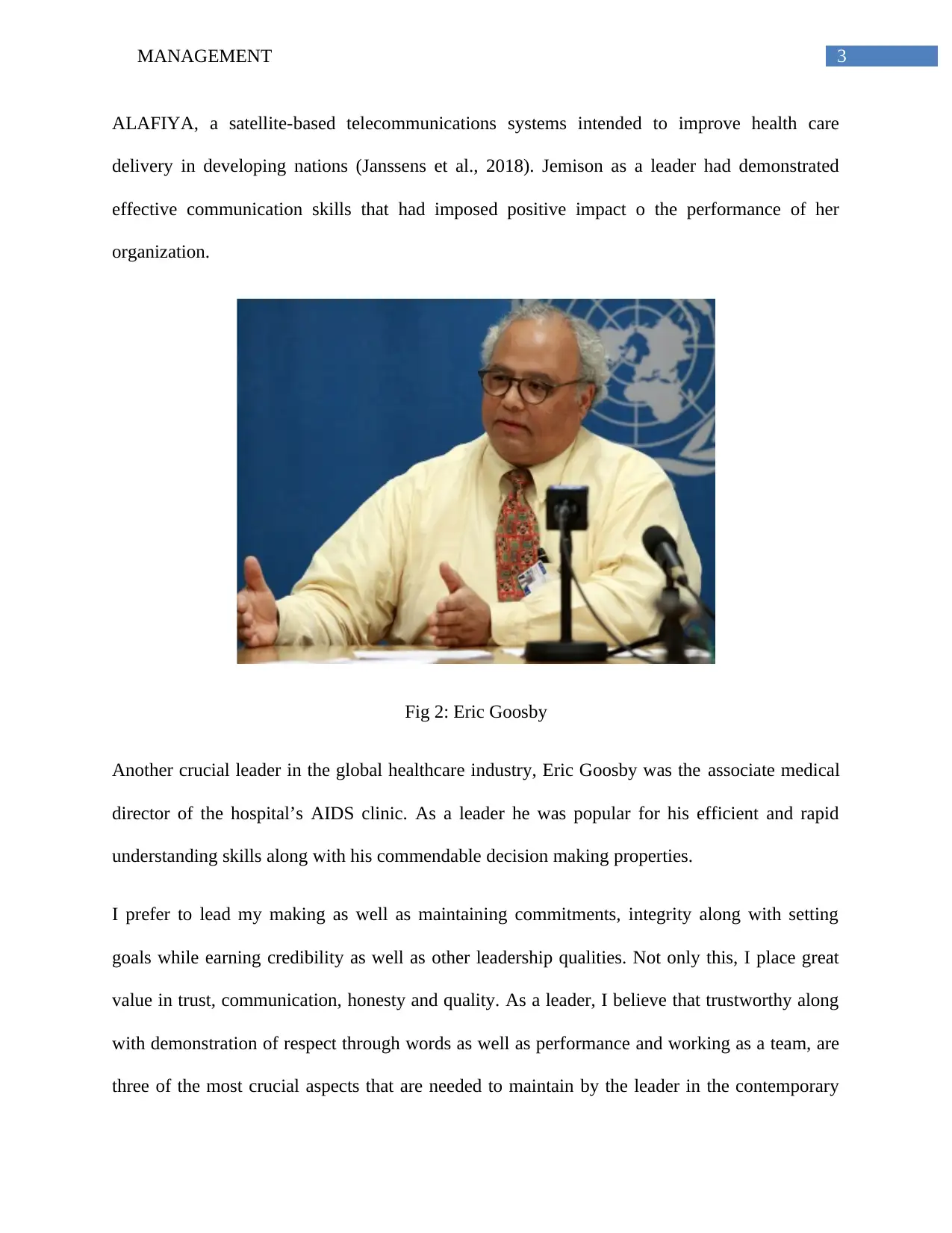
3MANAGEMENT
ALAFIYA, a satellite-based telecommunications systems intended to improve health care
delivery in developing nations (Janssens et al., 2018). Jemison as a leader had demonstrated
effective communication skills that had imposed positive impact o the performance of her
organization.
Fig 2: Eric Goosby
Another crucial leader in the global healthcare industry, Eric Goosby was the associate medical
director of the hospital’s AIDS clinic. As a leader he was popular for his efficient and rapid
understanding skills along with his commendable decision making properties.
I prefer to lead my making as well as maintaining commitments, integrity along with setting
goals while earning credibility as well as other leadership qualities. Not only this, I place great
value in trust, communication, honesty and quality. As a leader, I believe that trustworthy along
with demonstration of respect through words as well as performance and working as a team, are
three of the most crucial aspects that are needed to maintain by the leader in the contemporary
ALAFIYA, a satellite-based telecommunications systems intended to improve health care
delivery in developing nations (Janssens et al., 2018). Jemison as a leader had demonstrated
effective communication skills that had imposed positive impact o the performance of her
organization.
Fig 2: Eric Goosby
Another crucial leader in the global healthcare industry, Eric Goosby was the associate medical
director of the hospital’s AIDS clinic. As a leader he was popular for his efficient and rapid
understanding skills along with his commendable decision making properties.
I prefer to lead my making as well as maintaining commitments, integrity along with setting
goals while earning credibility as well as other leadership qualities. Not only this, I place great
value in trust, communication, honesty and quality. As a leader, I believe that trustworthy along
with demonstration of respect through words as well as performance and working as a team, are
three of the most crucial aspects that are needed to maintain by the leader in the contemporary
Paraphrase This Document
Need a fresh take? Get an instant paraphrase of this document with our AI Paraphraser
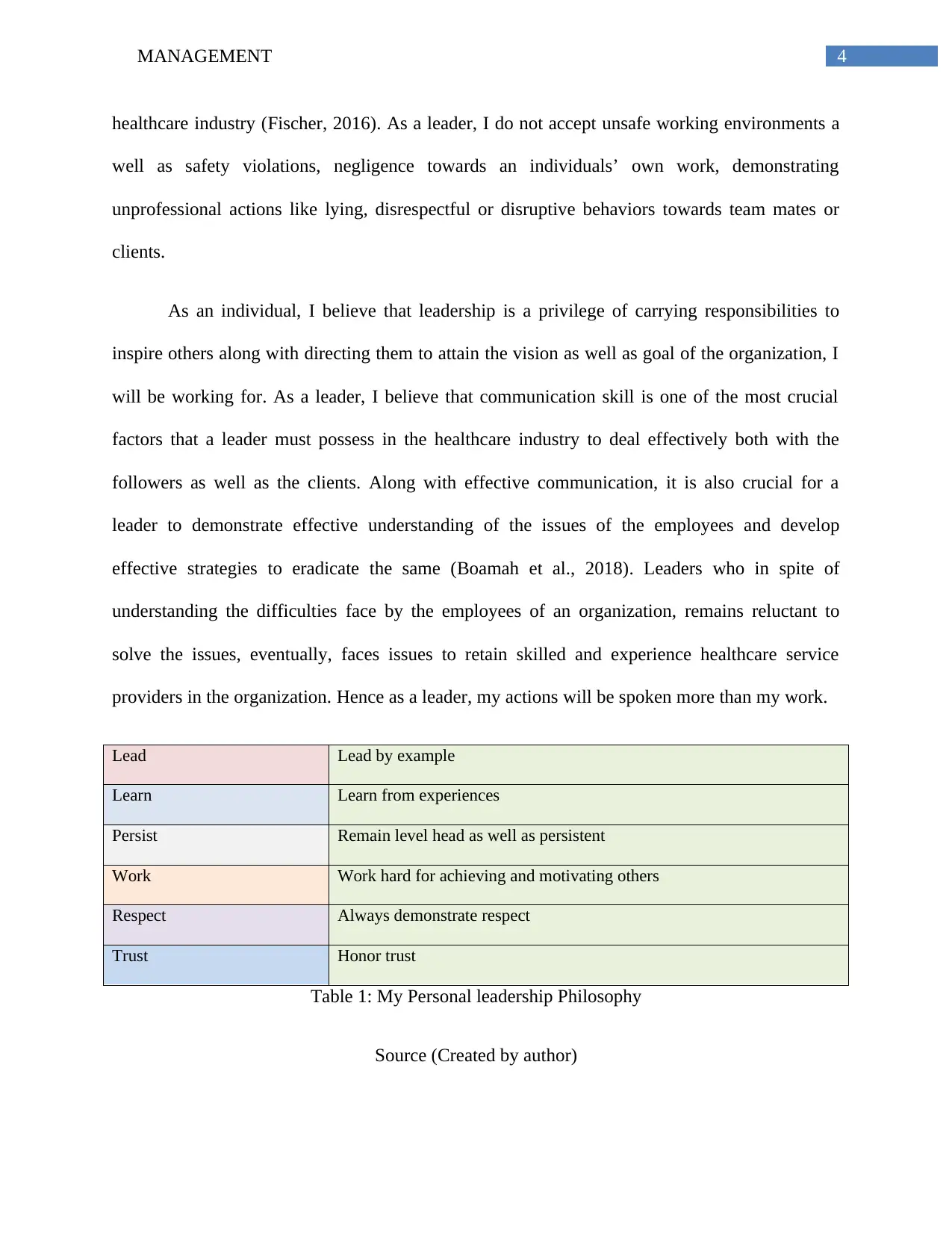
4MANAGEMENT
healthcare industry (Fischer, 2016). As a leader, I do not accept unsafe working environments a
well as safety violations, negligence towards an individuals’ own work, demonstrating
unprofessional actions like lying, disrespectful or disruptive behaviors towards team mates or
clients.
As an individual, I believe that leadership is a privilege of carrying responsibilities to
inspire others along with directing them to attain the vision as well as goal of the organization, I
will be working for. As a leader, I believe that communication skill is one of the most crucial
factors that a leader must possess in the healthcare industry to deal effectively both with the
followers as well as the clients. Along with effective communication, it is also crucial for a
leader to demonstrate effective understanding of the issues of the employees and develop
effective strategies to eradicate the same (Boamah et al., 2018). Leaders who in spite of
understanding the difficulties face by the employees of an organization, remains reluctant to
solve the issues, eventually, faces issues to retain skilled and experience healthcare service
providers in the organization. Hence as a leader, my actions will be spoken more than my work.
Lead Lead by example
Learn Learn from experiences
Persist Remain level head as well as persistent
Work Work hard for achieving and motivating others
Respect Always demonstrate respect
Trust Honor trust
Table 1: My Personal leadership Philosophy
Source (Created by author)
healthcare industry (Fischer, 2016). As a leader, I do not accept unsafe working environments a
well as safety violations, negligence towards an individuals’ own work, demonstrating
unprofessional actions like lying, disrespectful or disruptive behaviors towards team mates or
clients.
As an individual, I believe that leadership is a privilege of carrying responsibilities to
inspire others along with directing them to attain the vision as well as goal of the organization, I
will be working for. As a leader, I believe that communication skill is one of the most crucial
factors that a leader must possess in the healthcare industry to deal effectively both with the
followers as well as the clients. Along with effective communication, it is also crucial for a
leader to demonstrate effective understanding of the issues of the employees and develop
effective strategies to eradicate the same (Boamah et al., 2018). Leaders who in spite of
understanding the difficulties face by the employees of an organization, remains reluctant to
solve the issues, eventually, faces issues to retain skilled and experience healthcare service
providers in the organization. Hence as a leader, my actions will be spoken more than my work.
Lead Lead by example
Learn Learn from experiences
Persist Remain level head as well as persistent
Work Work hard for achieving and motivating others
Respect Always demonstrate respect
Trust Honor trust
Table 1: My Personal leadership Philosophy
Source (Created by author)
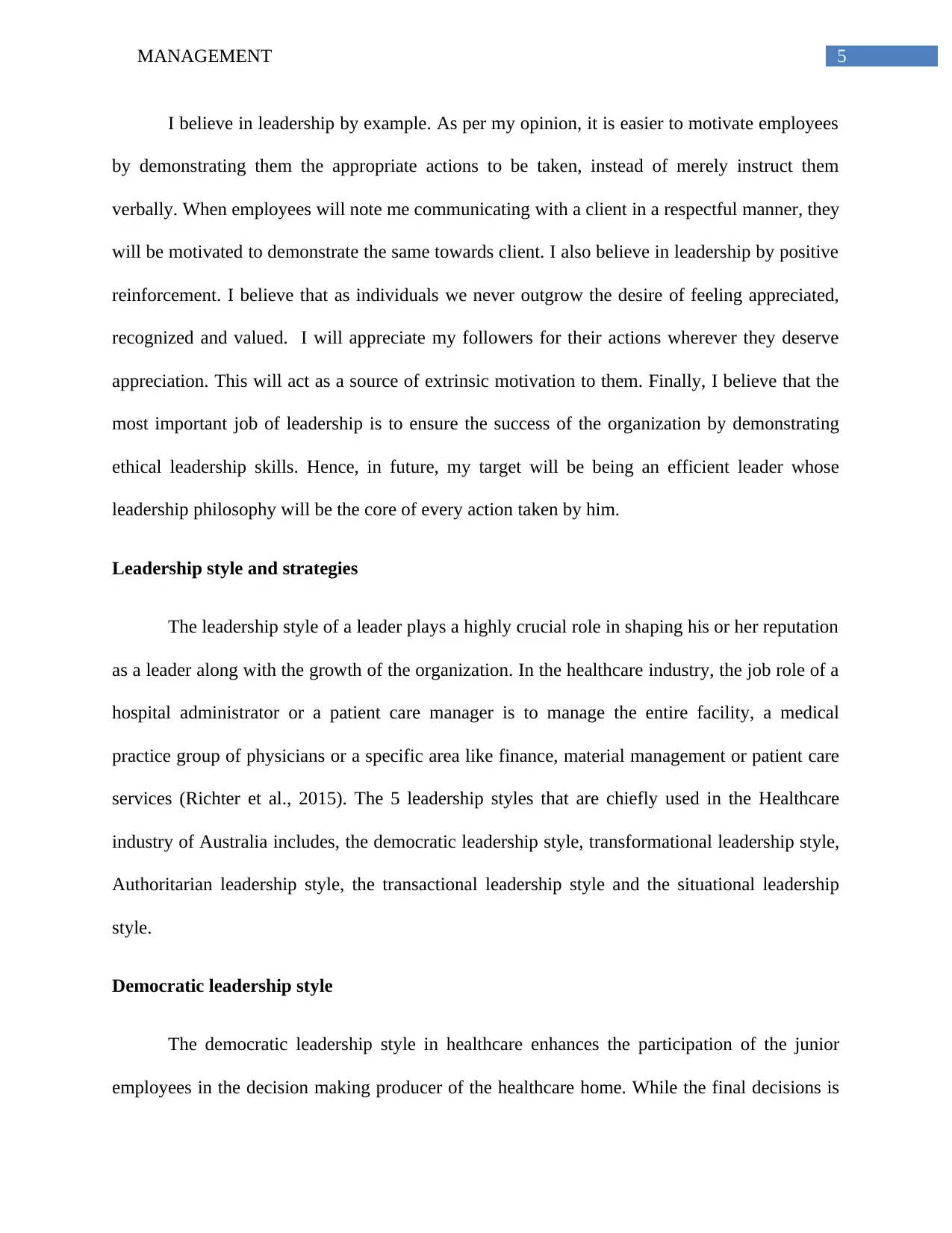
5MANAGEMENT
I believe in leadership by example. As per my opinion, it is easier to motivate employees
by demonstrating them the appropriate actions to be taken, instead of merely instruct them
verbally. When employees will note me communicating with a client in a respectful manner, they
will be motivated to demonstrate the same towards client. I also believe in leadership by positive
reinforcement. I believe that as individuals we never outgrow the desire of feeling appreciated,
recognized and valued. I will appreciate my followers for their actions wherever they deserve
appreciation. This will act as a source of extrinsic motivation to them. Finally, I believe that the
most important job of leadership is to ensure the success of the organization by demonstrating
ethical leadership skills. Hence, in future, my target will be being an efficient leader whose
leadership philosophy will be the core of every action taken by him.
Leadership style and strategies
The leadership style of a leader plays a highly crucial role in shaping his or her reputation
as a leader along with the growth of the organization. In the healthcare industry, the job role of a
hospital administrator or a patient care manager is to manage the entire facility, a medical
practice group of physicians or a specific area like finance, material management or patient care
services (Richter et al., 2015). The 5 leadership styles that are chiefly used in the Healthcare
industry of Australia includes, the democratic leadership style, transformational leadership style,
Authoritarian leadership style, the transactional leadership style and the situational leadership
style.
Democratic leadership style
The democratic leadership style in healthcare enhances the participation of the junior
employees in the decision making producer of the healthcare home. While the final decisions is
I believe in leadership by example. As per my opinion, it is easier to motivate employees
by demonstrating them the appropriate actions to be taken, instead of merely instruct them
verbally. When employees will note me communicating with a client in a respectful manner, they
will be motivated to demonstrate the same towards client. I also believe in leadership by positive
reinforcement. I believe that as individuals we never outgrow the desire of feeling appreciated,
recognized and valued. I will appreciate my followers for their actions wherever they deserve
appreciation. This will act as a source of extrinsic motivation to them. Finally, I believe that the
most important job of leadership is to ensure the success of the organization by demonstrating
ethical leadership skills. Hence, in future, my target will be being an efficient leader whose
leadership philosophy will be the core of every action taken by him.
Leadership style and strategies
The leadership style of a leader plays a highly crucial role in shaping his or her reputation
as a leader along with the growth of the organization. In the healthcare industry, the job role of a
hospital administrator or a patient care manager is to manage the entire facility, a medical
practice group of physicians or a specific area like finance, material management or patient care
services (Richter et al., 2015). The 5 leadership styles that are chiefly used in the Healthcare
industry of Australia includes, the democratic leadership style, transformational leadership style,
Authoritarian leadership style, the transactional leadership style and the situational leadership
style.
Democratic leadership style
The democratic leadership style in healthcare enhances the participation of the junior
employees in the decision making producer of the healthcare home. While the final decisions is
⊘ This is a preview!⊘
Do you want full access?
Subscribe today to unlock all pages.

Trusted by 1+ million students worldwide
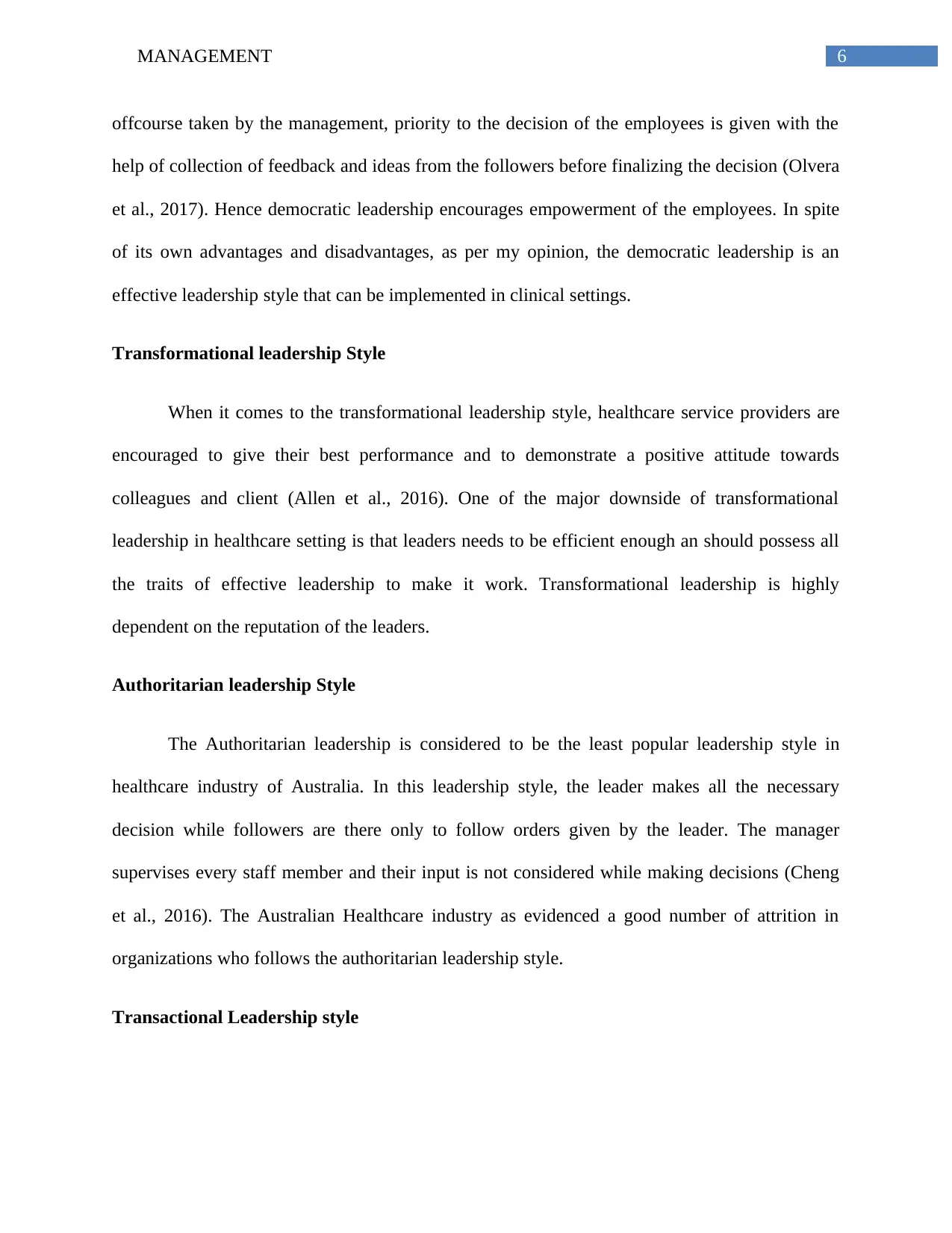
6MANAGEMENT
offcourse taken by the management, priority to the decision of the employees is given with the
help of collection of feedback and ideas from the followers before finalizing the decision (Olvera
et al., 2017). Hence democratic leadership encourages empowerment of the employees. In spite
of its own advantages and disadvantages, as per my opinion, the democratic leadership is an
effective leadership style that can be implemented in clinical settings.
Transformational leadership Style
When it comes to the transformational leadership style, healthcare service providers are
encouraged to give their best performance and to demonstrate a positive attitude towards
colleagues and client (Allen et al., 2016). One of the major downside of transformational
leadership in healthcare setting is that leaders needs to be efficient enough an should possess all
the traits of effective leadership to make it work. Transformational leadership is highly
dependent on the reputation of the leaders.
Authoritarian leadership Style
The Authoritarian leadership is considered to be the least popular leadership style in
healthcare industry of Australia. In this leadership style, the leader makes all the necessary
decision while followers are there only to follow orders given by the leader. The manager
supervises every staff member and their input is not considered while making decisions (Cheng
et al., 2016). The Australian Healthcare industry as evidenced a good number of attrition in
organizations who follows the authoritarian leadership style.
Transactional Leadership style
offcourse taken by the management, priority to the decision of the employees is given with the
help of collection of feedback and ideas from the followers before finalizing the decision (Olvera
et al., 2017). Hence democratic leadership encourages empowerment of the employees. In spite
of its own advantages and disadvantages, as per my opinion, the democratic leadership is an
effective leadership style that can be implemented in clinical settings.
Transformational leadership Style
When it comes to the transformational leadership style, healthcare service providers are
encouraged to give their best performance and to demonstrate a positive attitude towards
colleagues and client (Allen et al., 2016). One of the major downside of transformational
leadership in healthcare setting is that leaders needs to be efficient enough an should possess all
the traits of effective leadership to make it work. Transformational leadership is highly
dependent on the reputation of the leaders.
Authoritarian leadership Style
The Authoritarian leadership is considered to be the least popular leadership style in
healthcare industry of Australia. In this leadership style, the leader makes all the necessary
decision while followers are there only to follow orders given by the leader. The manager
supervises every staff member and their input is not considered while making decisions (Cheng
et al., 2016). The Australian Healthcare industry as evidenced a good number of attrition in
organizations who follows the authoritarian leadership style.
Transactional Leadership style
Paraphrase This Document
Need a fresh take? Get an instant paraphrase of this document with our AI Paraphraser
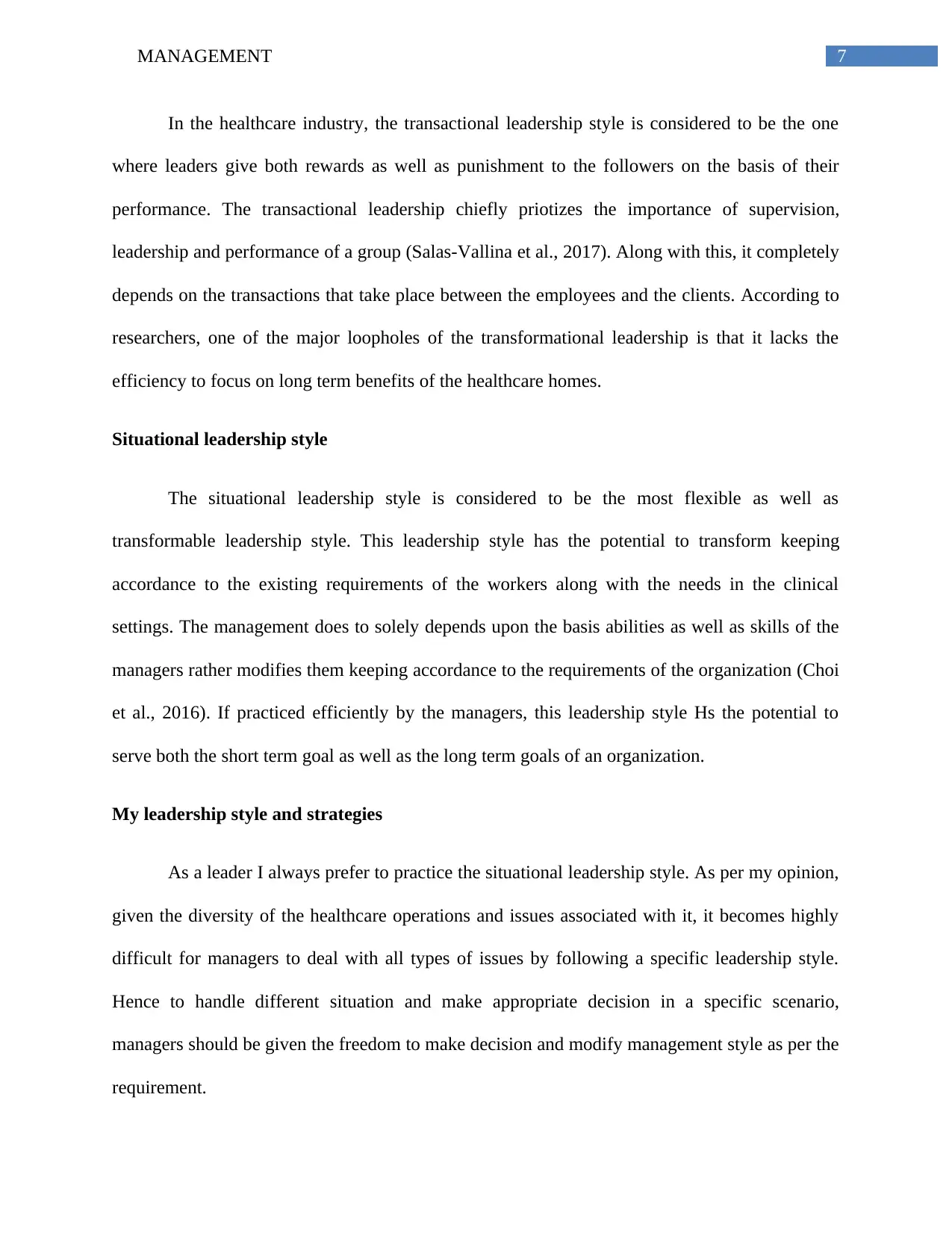
7MANAGEMENT
In the healthcare industry, the transactional leadership style is considered to be the one
where leaders give both rewards as well as punishment to the followers on the basis of their
performance. The transactional leadership chiefly priotizes the importance of supervision,
leadership and performance of a group (Salas-Vallina et al., 2017). Along with this, it completely
depends on the transactions that take place between the employees and the clients. According to
researchers, one of the major loopholes of the transformational leadership is that it lacks the
efficiency to focus on long term benefits of the healthcare homes.
Situational leadership style
The situational leadership style is considered to be the most flexible as well as
transformable leadership style. This leadership style has the potential to transform keeping
accordance to the existing requirements of the workers along with the needs in the clinical
settings. The management does to solely depends upon the basis abilities as well as skills of the
managers rather modifies them keeping accordance to the requirements of the organization (Choi
et al., 2016). If practiced efficiently by the managers, this leadership style Hs the potential to
serve both the short term goal as well as the long term goals of an organization.
My leadership style and strategies
As a leader I always prefer to practice the situational leadership style. As per my opinion,
given the diversity of the healthcare operations and issues associated with it, it becomes highly
difficult for managers to deal with all types of issues by following a specific leadership style.
Hence to handle different situation and make appropriate decision in a specific scenario,
managers should be given the freedom to make decision and modify management style as per the
requirement.
In the healthcare industry, the transactional leadership style is considered to be the one
where leaders give both rewards as well as punishment to the followers on the basis of their
performance. The transactional leadership chiefly priotizes the importance of supervision,
leadership and performance of a group (Salas-Vallina et al., 2017). Along with this, it completely
depends on the transactions that take place between the employees and the clients. According to
researchers, one of the major loopholes of the transformational leadership is that it lacks the
efficiency to focus on long term benefits of the healthcare homes.
Situational leadership style
The situational leadership style is considered to be the most flexible as well as
transformable leadership style. This leadership style has the potential to transform keeping
accordance to the existing requirements of the workers along with the needs in the clinical
settings. The management does to solely depends upon the basis abilities as well as skills of the
managers rather modifies them keeping accordance to the requirements of the organization (Choi
et al., 2016). If practiced efficiently by the managers, this leadership style Hs the potential to
serve both the short term goal as well as the long term goals of an organization.
My leadership style and strategies
As a leader I always prefer to practice the situational leadership style. As per my opinion,
given the diversity of the healthcare operations and issues associated with it, it becomes highly
difficult for managers to deal with all types of issues by following a specific leadership style.
Hence to handle different situation and make appropriate decision in a specific scenario,
managers should be given the freedom to make decision and modify management style as per the
requirement.
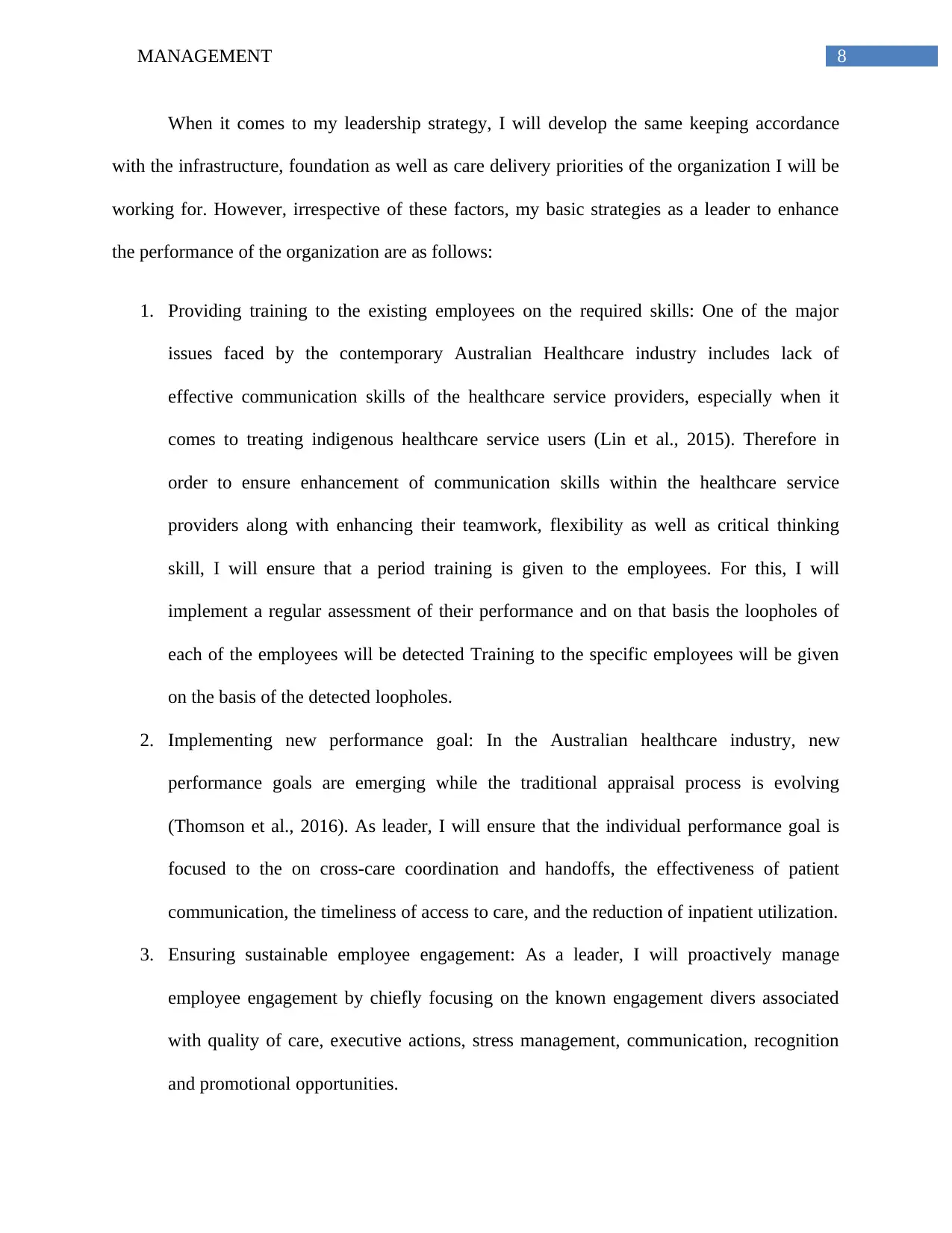
8MANAGEMENT
When it comes to my leadership strategy, I will develop the same keeping accordance
with the infrastructure, foundation as well as care delivery priorities of the organization I will be
working for. However, irrespective of these factors, my basic strategies as a leader to enhance
the performance of the organization are as follows:
1. Providing training to the existing employees on the required skills: One of the major
issues faced by the contemporary Australian Healthcare industry includes lack of
effective communication skills of the healthcare service providers, especially when it
comes to treating indigenous healthcare service users (Lin et al., 2015). Therefore in
order to ensure enhancement of communication skills within the healthcare service
providers along with enhancing their teamwork, flexibility as well as critical thinking
skill, I will ensure that a period training is given to the employees. For this, I will
implement a regular assessment of their performance and on that basis the loopholes of
each of the employees will be detected Training to the specific employees will be given
on the basis of the detected loopholes.
2. Implementing new performance goal: In the Australian healthcare industry, new
performance goals are emerging while the traditional appraisal process is evolving
(Thomson et al., 2016). As leader, I will ensure that the individual performance goal is
focused to the on cross-care coordination and handoffs, the effectiveness of patient
communication, the timeliness of access to care, and the reduction of inpatient utilization.
3. Ensuring sustainable employee engagement: As a leader, I will proactively manage
employee engagement by chiefly focusing on the known engagement divers associated
with quality of care, executive actions, stress management, communication, recognition
and promotional opportunities.
When it comes to my leadership strategy, I will develop the same keeping accordance
with the infrastructure, foundation as well as care delivery priorities of the organization I will be
working for. However, irrespective of these factors, my basic strategies as a leader to enhance
the performance of the organization are as follows:
1. Providing training to the existing employees on the required skills: One of the major
issues faced by the contemporary Australian Healthcare industry includes lack of
effective communication skills of the healthcare service providers, especially when it
comes to treating indigenous healthcare service users (Lin et al., 2015). Therefore in
order to ensure enhancement of communication skills within the healthcare service
providers along with enhancing their teamwork, flexibility as well as critical thinking
skill, I will ensure that a period training is given to the employees. For this, I will
implement a regular assessment of their performance and on that basis the loopholes of
each of the employees will be detected Training to the specific employees will be given
on the basis of the detected loopholes.
2. Implementing new performance goal: In the Australian healthcare industry, new
performance goals are emerging while the traditional appraisal process is evolving
(Thomson et al., 2016). As leader, I will ensure that the individual performance goal is
focused to the on cross-care coordination and handoffs, the effectiveness of patient
communication, the timeliness of access to care, and the reduction of inpatient utilization.
3. Ensuring sustainable employee engagement: As a leader, I will proactively manage
employee engagement by chiefly focusing on the known engagement divers associated
with quality of care, executive actions, stress management, communication, recognition
and promotional opportunities.
⊘ This is a preview!⊘
Do you want full access?
Subscribe today to unlock all pages.

Trusted by 1+ million students worldwide
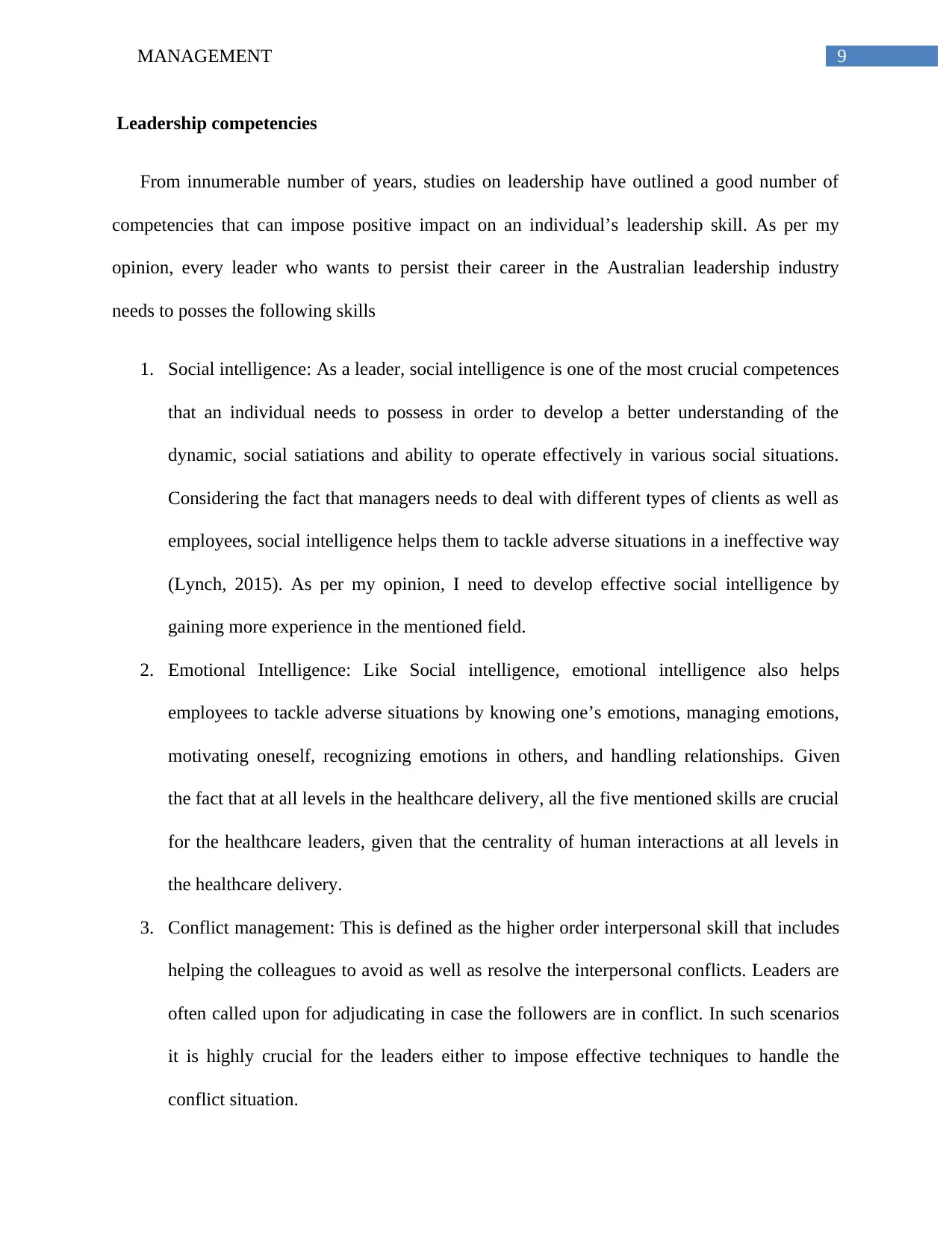
9MANAGEMENT
Leadership competencies
From innumerable number of years, studies on leadership have outlined a good number of
competencies that can impose positive impact on an individual’s leadership skill. As per my
opinion, every leader who wants to persist their career in the Australian leadership industry
needs to posses the following skills
1. Social intelligence: As a leader, social intelligence is one of the most crucial competences
that an individual needs to possess in order to develop a better understanding of the
dynamic, social satiations and ability to operate effectively in various social situations.
Considering the fact that managers needs to deal with different types of clients as well as
employees, social intelligence helps them to tackle adverse situations in a ineffective way
(Lynch, 2015). As per my opinion, I need to develop effective social intelligence by
gaining more experience in the mentioned field.
2. Emotional Intelligence: Like Social intelligence, emotional intelligence also helps
employees to tackle adverse situations by knowing one’s emotions, managing emotions,
motivating oneself, recognizing emotions in others, and handling relationships. Given
the fact that at all levels in the healthcare delivery, all the five mentioned skills are crucial
for the healthcare leaders, given that the centrality of human interactions at all levels in
the healthcare delivery.
3. Conflict management: This is defined as the higher order interpersonal skill that includes
helping the colleagues to avoid as well as resolve the interpersonal conflicts. Leaders are
often called upon for adjudicating in case the followers are in conflict. In such scenarios
it is highly crucial for the leaders either to impose effective techniques to handle the
conflict situation.
Leadership competencies
From innumerable number of years, studies on leadership have outlined a good number of
competencies that can impose positive impact on an individual’s leadership skill. As per my
opinion, every leader who wants to persist their career in the Australian leadership industry
needs to posses the following skills
1. Social intelligence: As a leader, social intelligence is one of the most crucial competences
that an individual needs to possess in order to develop a better understanding of the
dynamic, social satiations and ability to operate effectively in various social situations.
Considering the fact that managers needs to deal with different types of clients as well as
employees, social intelligence helps them to tackle adverse situations in a ineffective way
(Lynch, 2015). As per my opinion, I need to develop effective social intelligence by
gaining more experience in the mentioned field.
2. Emotional Intelligence: Like Social intelligence, emotional intelligence also helps
employees to tackle adverse situations by knowing one’s emotions, managing emotions,
motivating oneself, recognizing emotions in others, and handling relationships. Given
the fact that at all levels in the healthcare delivery, all the five mentioned skills are crucial
for the healthcare leaders, given that the centrality of human interactions at all levels in
the healthcare delivery.
3. Conflict management: This is defined as the higher order interpersonal skill that includes
helping the colleagues to avoid as well as resolve the interpersonal conflicts. Leaders are
often called upon for adjudicating in case the followers are in conflict. In such scenarios
it is highly crucial for the leaders either to impose effective techniques to handle the
conflict situation.
Paraphrase This Document
Need a fresh take? Get an instant paraphrase of this document with our AI Paraphraser
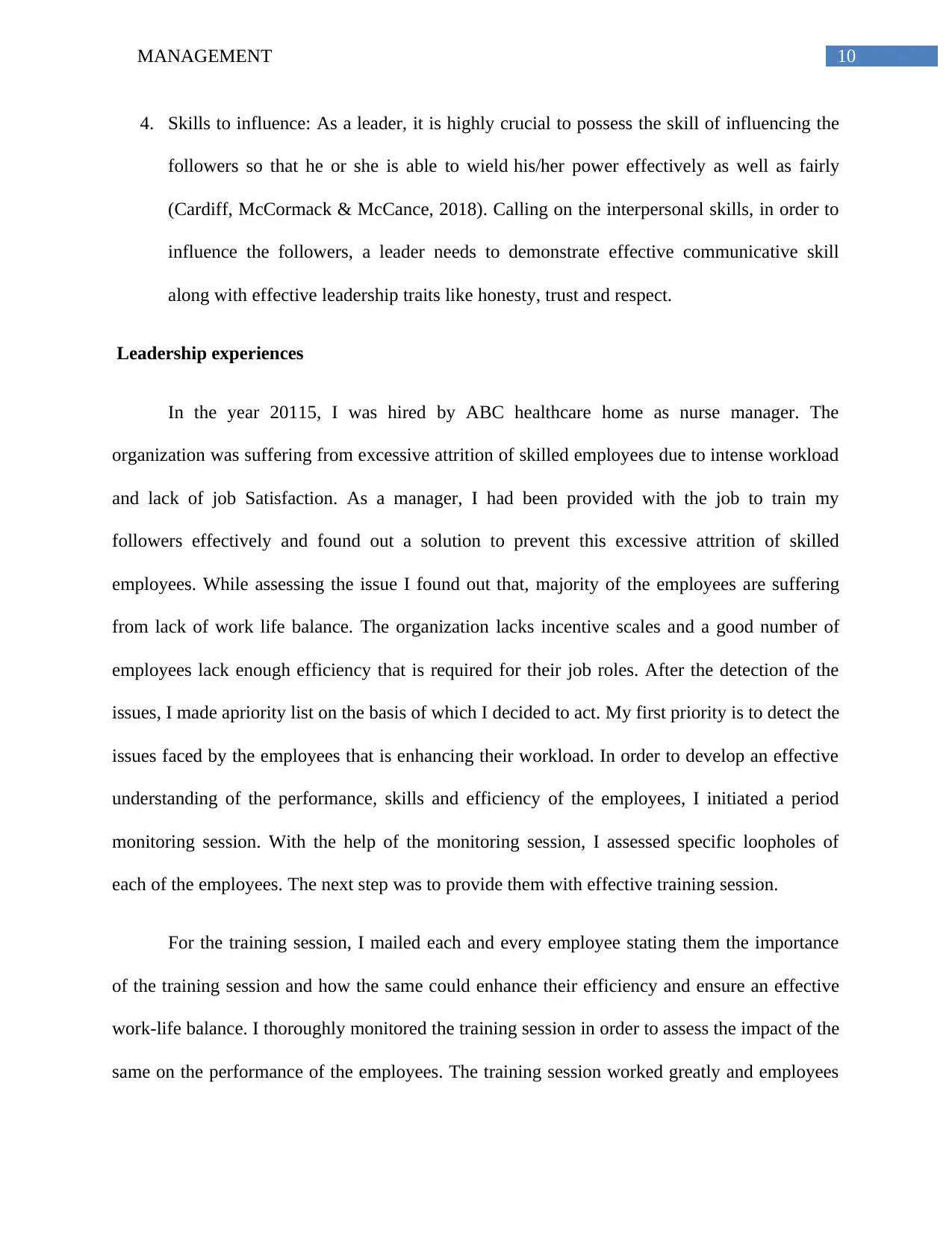
10MANAGEMENT
4. Skills to influence: As a leader, it is highly crucial to possess the skill of influencing the
followers so that he or she is able to wield his/her power effectively as well as fairly
(Cardiff, McCormack & McCance, 2018). Calling on the interpersonal skills, in order to
influence the followers, a leader needs to demonstrate effective communicative skill
along with effective leadership traits like honesty, trust and respect.
Leadership experiences
In the year 20115, I was hired by ABC healthcare home as nurse manager. The
organization was suffering from excessive attrition of skilled employees due to intense workload
and lack of job Satisfaction. As a manager, I had been provided with the job to train my
followers effectively and found out a solution to prevent this excessive attrition of skilled
employees. While assessing the issue I found out that, majority of the employees are suffering
from lack of work life balance. The organization lacks incentive scales and a good number of
employees lack enough efficiency that is required for their job roles. After the detection of the
issues, I made apriority list on the basis of which I decided to act. My first priority is to detect the
issues faced by the employees that is enhancing their workload. In order to develop an effective
understanding of the performance, skills and efficiency of the employees, I initiated a period
monitoring session. With the help of the monitoring session, I assessed specific loopholes of
each of the employees. The next step was to provide them with effective training session.
For the training session, I mailed each and every employee stating them the importance
of the training session and how the same could enhance their efficiency and ensure an effective
work-life balance. I thoroughly monitored the training session in order to assess the impact of the
same on the performance of the employees. The training session worked greatly and employees
4. Skills to influence: As a leader, it is highly crucial to possess the skill of influencing the
followers so that he or she is able to wield his/her power effectively as well as fairly
(Cardiff, McCormack & McCance, 2018). Calling on the interpersonal skills, in order to
influence the followers, a leader needs to demonstrate effective communicative skill
along with effective leadership traits like honesty, trust and respect.
Leadership experiences
In the year 20115, I was hired by ABC healthcare home as nurse manager. The
organization was suffering from excessive attrition of skilled employees due to intense workload
and lack of job Satisfaction. As a manager, I had been provided with the job to train my
followers effectively and found out a solution to prevent this excessive attrition of skilled
employees. While assessing the issue I found out that, majority of the employees are suffering
from lack of work life balance. The organization lacks incentive scales and a good number of
employees lack enough efficiency that is required for their job roles. After the detection of the
issues, I made apriority list on the basis of which I decided to act. My first priority is to detect the
issues faced by the employees that is enhancing their workload. In order to develop an effective
understanding of the performance, skills and efficiency of the employees, I initiated a period
monitoring session. With the help of the monitoring session, I assessed specific loopholes of
each of the employees. The next step was to provide them with effective training session.
For the training session, I mailed each and every employee stating them the importance
of the training session and how the same could enhance their efficiency and ensure an effective
work-life balance. I thoroughly monitored the training session in order to assess the impact of the
same on the performance of the employees. The training session worked greatly and employees
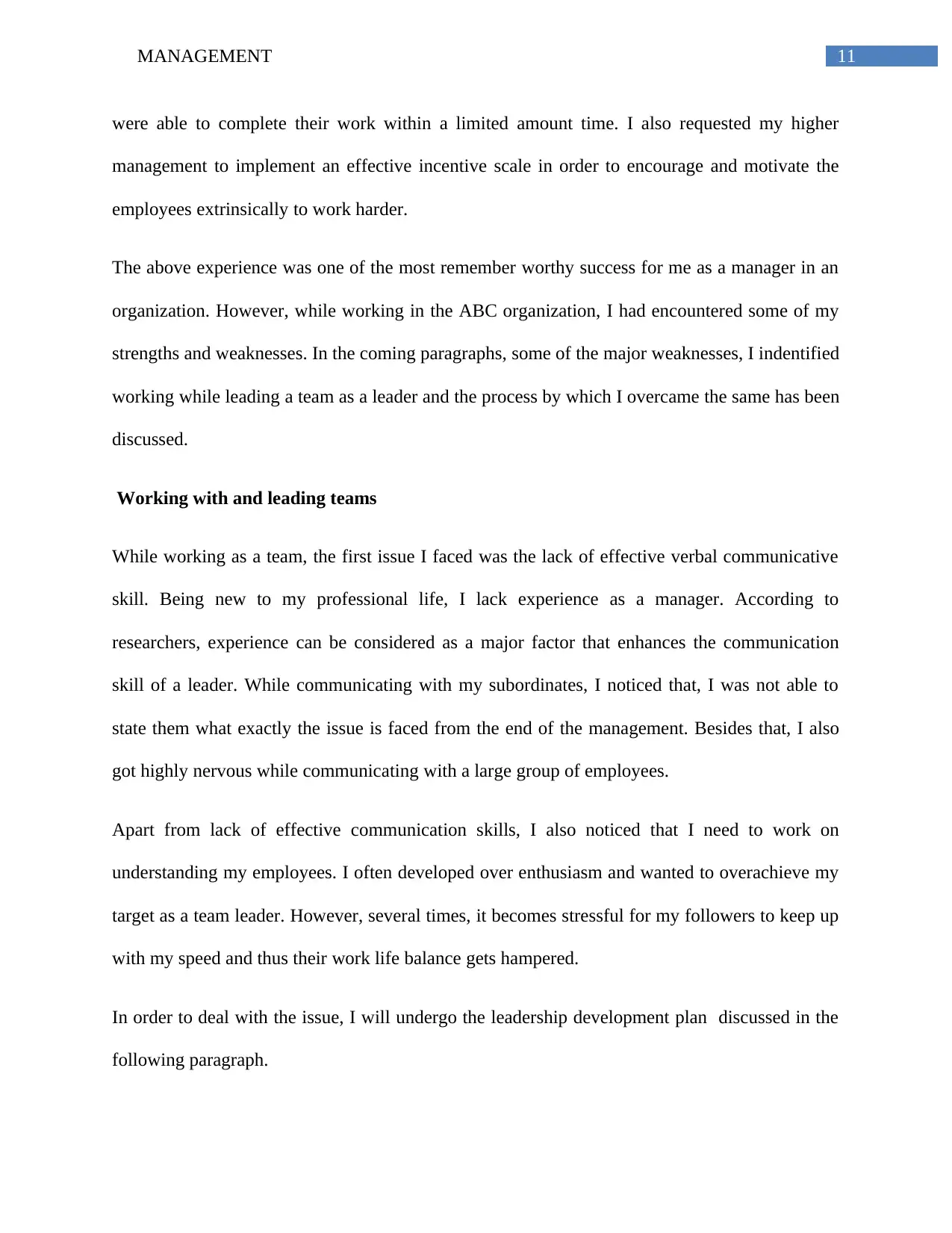
11MANAGEMENT
were able to complete their work within a limited amount time. I also requested my higher
management to implement an effective incentive scale in order to encourage and motivate the
employees extrinsically to work harder.
The above experience was one of the most remember worthy success for me as a manager in an
organization. However, while working in the ABC organization, I had encountered some of my
strengths and weaknesses. In the coming paragraphs, some of the major weaknesses, I indentified
working while leading a team as a leader and the process by which I overcame the same has been
discussed.
Working with and leading teams
While working as a team, the first issue I faced was the lack of effective verbal communicative
skill. Being new to my professional life, I lack experience as a manager. According to
researchers, experience can be considered as a major factor that enhances the communication
skill of a leader. While communicating with my subordinates, I noticed that, I was not able to
state them what exactly the issue is faced from the end of the management. Besides that, I also
got highly nervous while communicating with a large group of employees.
Apart from lack of effective communication skills, I also noticed that I need to work on
understanding my employees. I often developed over enthusiasm and wanted to overachieve my
target as a team leader. However, several times, it becomes stressful for my followers to keep up
with my speed and thus their work life balance gets hampered.
In order to deal with the issue, I will undergo the leadership development plan discussed in the
following paragraph.
were able to complete their work within a limited amount time. I also requested my higher
management to implement an effective incentive scale in order to encourage and motivate the
employees extrinsically to work harder.
The above experience was one of the most remember worthy success for me as a manager in an
organization. However, while working in the ABC organization, I had encountered some of my
strengths and weaknesses. In the coming paragraphs, some of the major weaknesses, I indentified
working while leading a team as a leader and the process by which I overcame the same has been
discussed.
Working with and leading teams
While working as a team, the first issue I faced was the lack of effective verbal communicative
skill. Being new to my professional life, I lack experience as a manager. According to
researchers, experience can be considered as a major factor that enhances the communication
skill of a leader. While communicating with my subordinates, I noticed that, I was not able to
state them what exactly the issue is faced from the end of the management. Besides that, I also
got highly nervous while communicating with a large group of employees.
Apart from lack of effective communication skills, I also noticed that I need to work on
understanding my employees. I often developed over enthusiasm and wanted to overachieve my
target as a team leader. However, several times, it becomes stressful for my followers to keep up
with my speed and thus their work life balance gets hampered.
In order to deal with the issue, I will undergo the leadership development plan discussed in the
following paragraph.
⊘ This is a preview!⊘
Do you want full access?
Subscribe today to unlock all pages.

Trusted by 1+ million students worldwide
1 out of 18
Related Documents
Your All-in-One AI-Powered Toolkit for Academic Success.
+13062052269
info@desklib.com
Available 24*7 on WhatsApp / Email
![[object Object]](/_next/static/media/star-bottom.7253800d.svg)
Unlock your academic potential
Copyright © 2020–2026 A2Z Services. All Rights Reserved. Developed and managed by ZUCOL.





